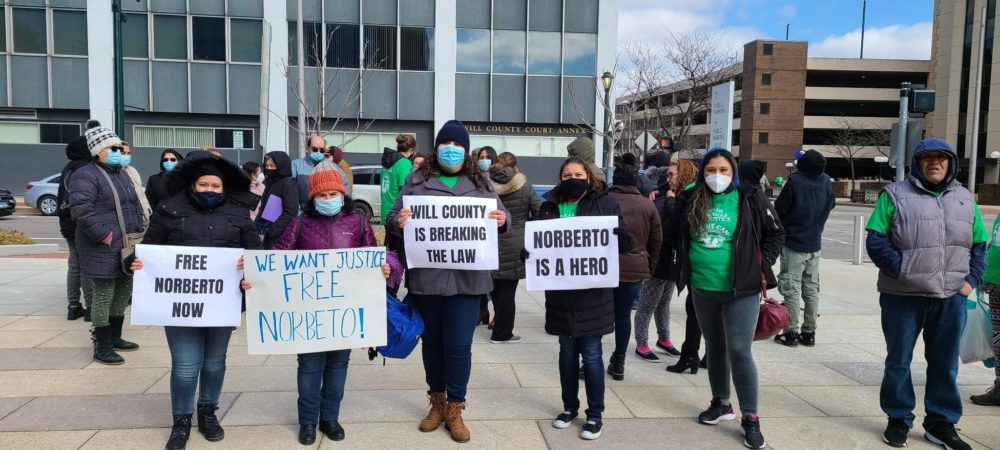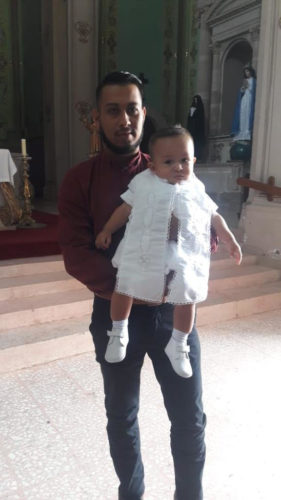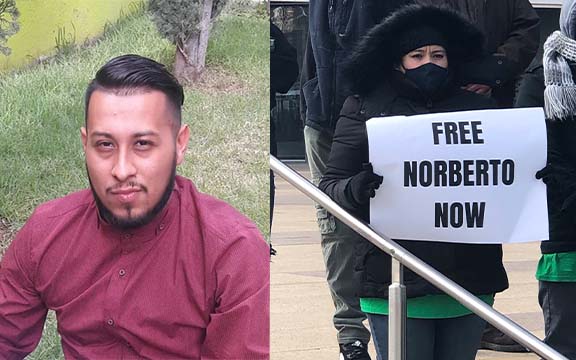More than twenty Illinois elected officials call on Illinois Attorney General Kwame Raoul to enforce the Illinois Way Forward Act/TRUST Act, that bans immigration detention in the state, on behalf of thirty-year-old Norberto Navarro. Navarro, who partly grew up in South Chicago, is a U.S. permanent resident being detained at the Will County Adult Detention Facility illegally, said Navarro’s attorney, along with immigration advocates and community and family members who demand his immediate release.
Navarro’s intricate story dates back to 2017 when he became a critical witness in a reckless homicide case. Navarro, who works in agriculture in rural Beecher, IL, about an hour’s drive from Chicago, ran to the scene of a car accident to aid passengers in a vehicle that was struck by a speeding car.
The passengers, a pregnant woman and her three children, did not survive. According to Navarro’s mother, Aida Navarro, who spoke to the Weekly, Navarro called the police. He saw when the children sitting in the back seat, still alive, coughed out blood, she said. The driver, Sean Woulfe, twenty-five, was charged with sixteen reckless homicide charges in connection with the fatal crash. He is free while he awaits trial, yet Navarro is detained.
As a critical witness in the case, Navarro, a Calumet City resident and an engaged community member of the Southeast Side, volunteered to testify in the trial for the prosecution that was scheduled for March 22. He has been detained in Will County jail since January.
Two years after the collision, Navarro was convicted for a drug charge in Texas, near El Paso. After he completed his forty-month sentence there, he wasn’t released, but instead transferred to a different detention facility in New Mexico, where Immigration and Customs Enforcement (ICE) began deportation proceedings.

At a protest outside the Will County Courthouse in early March, Ana Guajardo, the executive director of Centro de Trabajadores Unidos, said his detention is illegal because he has not been charged or convicted of any crime in Will County. “He is simply a witness, yet they are detaining him solely because he has chosen to cooperate in a criminal case.”
According to Sarah Southey, legal clinic coordinator at Centro de Trabajadores Unidos, ICE closed Navarro’s immigration case administratively—meaning ICE can reopen the case if they chose to. But rather than releasing him after serving his time in New Mexico, the Illinois State’s Attorney in a written request to ICE ordered his transfer to the Will County Adult Detention Facility as a material witness for the 2017 accident.
Southey said this wasn’t fair to him under President Joe Biden’s new immigration enforcement guidelines that indicate ICE should not prioritize individuals for deportation with circumstances like Navarro’s.
“Norberto is a good candidate for not having his [immigration] proceedings reopen,” she said. “He has lived in the U.S. for over twenty years. He has a young daughter here, his entire family is here. He knows no other home and, on top of all that, people who are witnesses and victims of crimes are not supposed to be priorities for deportation.”
The Illinois Way Forward Act, which came into effect on January 1—as he was being transferred to Will County—prohibits local law enforcement from carrying out immigration operations, making arrests, facilitating transfers, and holding detainees. But the agreement between ICE and the Illinois State’s Attorney states Navarro will be transferred back to ICE custody after he testifies on March 22 and face deportation.
Navarro’s attorney, Nicole Hallett, from the Immigrant Rights’ Clinic at the University of Chicago, said this is the first time the Illinois Way Forward Act has been invoked in court to request someone’s release.. “Most of the time, when there are violations, it happens very quickly…that you can’t stop it…like someone’s being held for a couple of hours… in order for ICE to pick them up,” said Hallett.
“We have a chance to stop it because [Navarro has] been held for months.”
During the protest on March 8, Navarro’s attorneys said they presented a motion at the Will County Courthouse opposing Navarro’s detention, arguing that Navarro’s imprisonment is illegal under Illinois laws and a violation of his constitutional rights. In response, the Will County State’s Attorney set a $1 million bond for his release, which the family cannot afford to pay.
Navarro’s attorneys were able to get the State’s Attorney to certify a U visa for him, since Illinois law mandates it through the Illinois VOICES Act. A U visa is meant to grant residency and citizenship to those who have suffered significant mental or physical abuse from a criminal activity. The U visa statute that Congress passed defines a victim as both the person who was the intended victim of a criminal activity, but it also can include bystanders or other people who are harmed by a criminal activity and are willing to help law enforcement authorities in the investigation or prosecution, explained Hallett.
In Navarro’s case, a U visa would grant him permission to stay in the United States despite his criminal conviction. Hallett said Navarro is eligible because he was “severely affected” by the car accident in 2017. “He suffered psychological effects, nightmares, anxiety, he had to go to counseling,” she said.
But while he was recently certified as a victim, it takes years to process these visas. “We don’t want to deport someone while they’re waiting,” Hallett said. “Because he has this U visa certification, he should no longer be a [deportation] priority and they should close his immigration case.”
Aida Navarro told the Weekly her son was never the same after the accident, often waking up in the middle of the night. “The day the accident happened my son cried so much and he [became] so scared and traumatized by what he saw. I told my son to go to counseling. He was scared and he wouldn’t eat.”

She is still grieving the death of her eldest son, who died in a car accident last May. “He was always waiting for his brother Norberto to come back. He would call me and ask, ‘Mom, when is my little brother getting out?’”
Recalling old times, Aida said Norberto would accompany her to volunteering and advocacy events in the South Chicago neighborhood where they lived for a long time. “Since he was a little boy, since he was seven years old, Norberto has been with me in the marches against violence, against gangs, and he loved going with me to Springfield…and we would fight for immigrant rights just like we are fighting for him right now. We had to fight for many immigrants who were also at risk of deportation.”
Aida said she has to remain strong for her grandchildren who constantly ask for their fathers, but that it is very difficult to do.
“I need my son. It’s not going to bring back the one who died, but I need [Norberto] to be a comfort to me.”
On March 22, immigrant advocates, community members and his family rallied outside the Will County Courthouse. They demanded that ICE close Navarro’s immigration proceedings and release him. However, sources said his testimony was postponed.
Alma Campos is the Weekly’s immigration editor. She last wrote about the physical barriers that segregate Chicago.




This is quite an unfortunate incident. The bulwark of justice and equity has stood and still standing for years. Justice could be delayed in some circumstances but it should not be denied. My appeal to the authorities is to ensure that Navarro’s case is handled with great precedence to justice, equity and fairness.